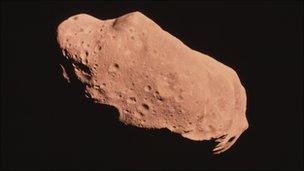New Trojan asteroid found in Neptune's dead zone
- Published

Many new Trojan asteroids await discovery
Astronomers have found a new 100km diameter Trojan asteroid near Neptune.
Trojans are a type of asteroid found in space graveyards. They shed light on what the early Solar System was like.
Scientists say up to 150 similar objects could await discovery in the same area.
The new asteroid was discovered by Dr Scott Sheppard of the Carnegie Institution and Dr Chadwick Trujillo of the Gemini Observatory, Hawaii.
Their findings are published in the journal Science.
Space graveyard
Trojan asteroids orbit in the same plane as a planet, but don't collide with it. This is because they occur in "dead zones" where gravitational forces allow the asteroid to orbit at precisely the same speed as the planet.
These Lagrangian points, as the dead zones are called, occur 60 degrees ahead and behind the planet. They are graveyards of space junk "frozen in time" since the formation of the Solar System.
Almost all of the 200,000 Trojan asteroids larger than 1km found to date orbit with Jupiter. However, the newly discovered Trojan is one of only six associated with Neptune.
Asteroid 2008LC18 occurs in an area of the sky where the Milky Way, our own galaxy, is especially bright.
Dr Sheppard said that his team had to devise a "a unique observing strategy" to spot the asteroid against this bright star field. They used interstellar dust to mask the star light so the 100km asteroid became clearly visible.
The breakthrough was made using the 8.2m Japanese Subaru telescope in Hawaii.
The scientists believe that there could be as many as 150 similar-sized objects in the cloud. Eventually, the Trojan cloud associated with Neptune could prove to be as big as that orbiting with Jupiter.
Professor Alan Fitzsimmons of Queens University Belfast, an expert on asteroids, said that it was "an incredibly exciting discovery. It's another important clue for unravelling the early evolution of the Solar System".